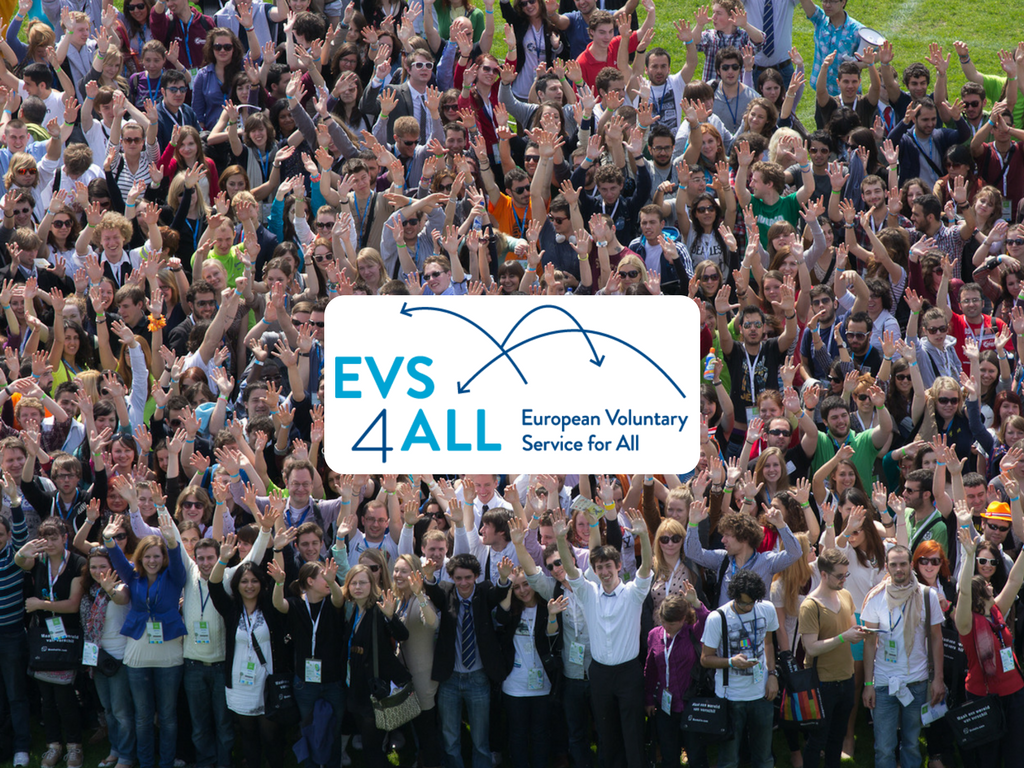Mar 15, 2017
One step further to an inclusive Europe
After more than 30 years of mobility programmes within the EU, the benefits of cross-border mobility of young people in terms of solidarity are remarkable. However, the accessibility of the these programmes must be questioned: programmes should be accessible for all young people, regardless of their educational and social background, and at this juncture of Euro-scepticism and increasing social inequality, it is important to strengthen inclusive approaches. European Voluntary Service for All (EVS4ALL) is an such an initiative that aims to make European Voluntary Service (EVS) more inclusive for young people with fewer opportunities. This two-year project is right now in the last stage of the whole process, that implies the Conference “Volunteering for Social Change” next week.
Since the beginning in 2015 two big efforts have been realised:
(1) to showcase the necessity for an inclusive European Voluntary Service and the corresponding policy recommendations
(2) to show how mobility programmes can be supported by digital learning formats in order to provide an asset for the engagement of the concerned group of young people.
‘Towards a More Inclusive Europe: The European Voluntary Service for All’
The original financial crisis implies consequences for the public spending that are visible in numbers of people that find themselves in precarious and vulnerable situations, especially young people. The limits of access for excluded young people have been shown in several European reports (e.g. the Policy Agenda for Volunteering in Europe). To counteract neo-liberal patterns and far-right’s movements within Europe, social inclusion must be fostered by civil societies organization’s commitment.
In the EVS4ALL consortium fourteen partners were discussing and proposing suggestions for policy implementations in order to enable the inclusion of people with disadvantaged backgrounds. The partners carried out national studies to assess the different and multiple barriers to mobility for this precarious group of young people. Improvements concern the European and the national level, in a wide range of areas: quality and accessibility (e.g. facilitating the accreditation process for small size CSOs), communication sharing and networking (e.g. creating toolkits to be available on the unified website), promotion and dissemination (e.g. Europe-wide campaign reaching the local level), support (e.g. extra fund for special mentorship), and flexibility (e.g. in terms of profiles). For the detailed proposal, download here the report.
‘Blended Mobilities’ Discovering Digital Learning
The other objective was to show how European mobility can combine and benefit from digital learning, especially regarding to young people with fewer opportunities. The idea was to experiment with different digital platforms based on the idea of “blended mobility”: ”The process of learning where digital technology is used alongside more traditional learning methods such as classroom, face-to-face mentoring, print materials.” For the understanding and the communicating of suggested tools (Padlet, Powtoon, Learning Badges, Erasmus+, Online Linguistic Support) there have been workshops in Germany and Romania. Five cases have been carried out last year with 20 volunteers and these results, amongst others: “digital tools training reported improved knowledge and new competences; tools encouraged and allowed collaboration; tools were a valuable addition to more traditional methods of communication, such as Skype and emails; greatest impact has been reported in relation to young people with fewer opportunities and in particular those lacking communication skills or having additional needs; most organisations feel they are not enough equipped and up-to-speed with technology and would need more specific IT training to be able to communicate and support young people” pp.16-17. For further details, you can download the report here.
This project was initiated by the Allianz Cultural Foundation, implemented in cooperation with Volonteurope and Itinéraire International, and coordinated by IKAB-Bildungswerk. Several partners from France, Germany, Poland, Romania, Spain and the United Kingdom have been represented in the consortium, including foundations and organisations from civil society and the fields of European youth and voluntary work.
